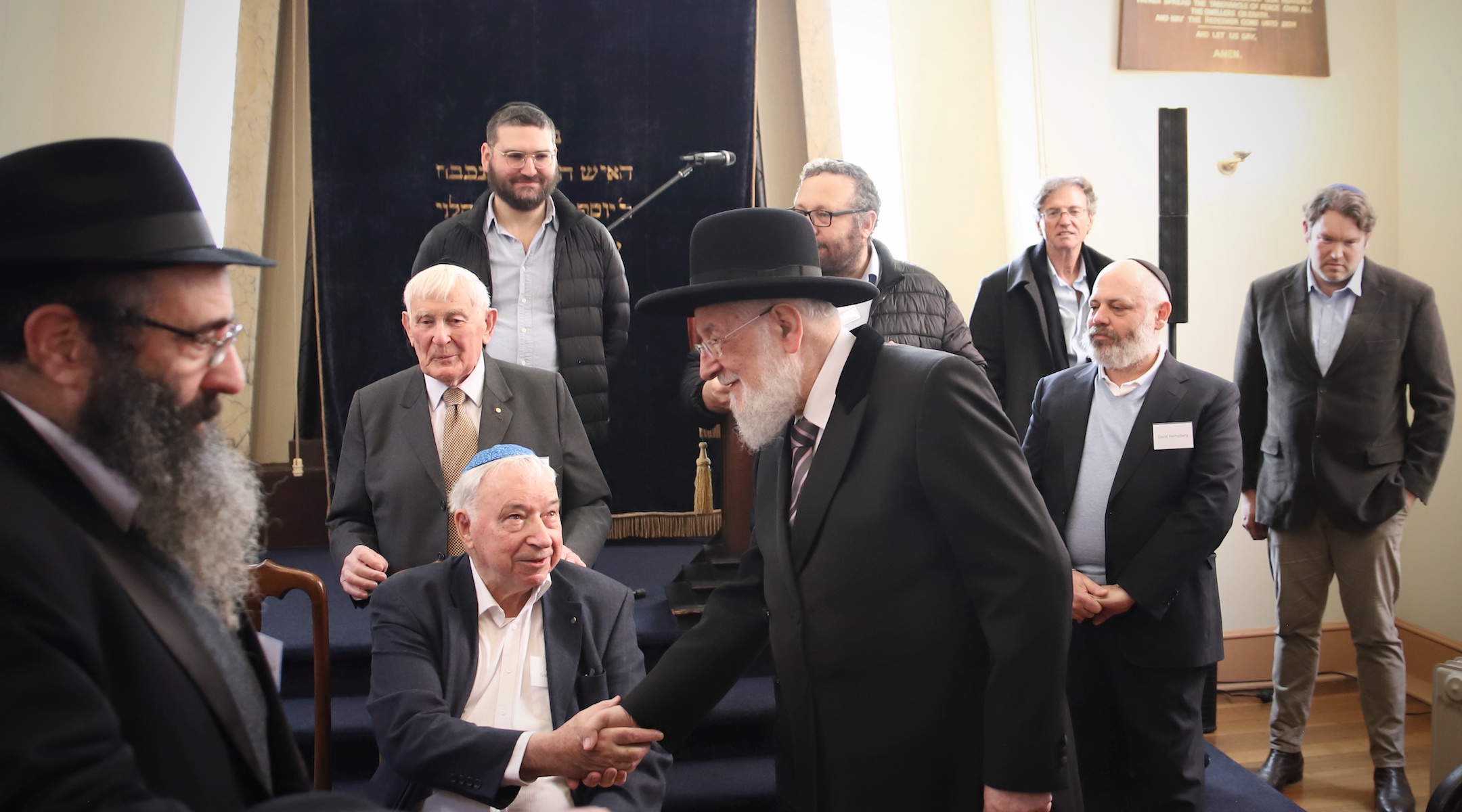MELBOURNE, Australia (JTA) — Tasmania, Australia’s smallest state in both population and size, is home to about half a million people. It is best known for its rugged terrain, its breathtaking natural beauty and its unique animal species — including the Tasmanian devil and the now extinct thylacine, or Tasmanian tiger.
But Tasmania has also always had a Jewish population in its capital city of Hobart, which was set up in 1804 as a penal colony for exiled British convicts. Eight Jews were tallied among the original 270 convicts who settled there.
The state is also home to Australia’s two oldest continuously operating synagogues: Hobart Hebrew Congregation, built in 1845, and the Launceston Synagogue, built one year later.
On Wednesday morning, Israel’s former chief Ashkenazi rabbi, Yisrael Meir Lau, paid a rare visit to the Launceston Synagogue. The event attracted around 50 people, including government ministers, representatives of Australia’s National Trust conservation group and members of Tasmania’s Jewish community.
“It’s very nice that you can be at the extremities and antipodes and still be part of the Jewish people,” said Betz Allen, a Tasmanian Jew who has lived in Launceston for 25 years. “Having Rabbi Lau here in person and taking the time and trouble to come [to Tasmania] was significant.”
“Even in the context of Australia, it’s a long way from anything,” he added.
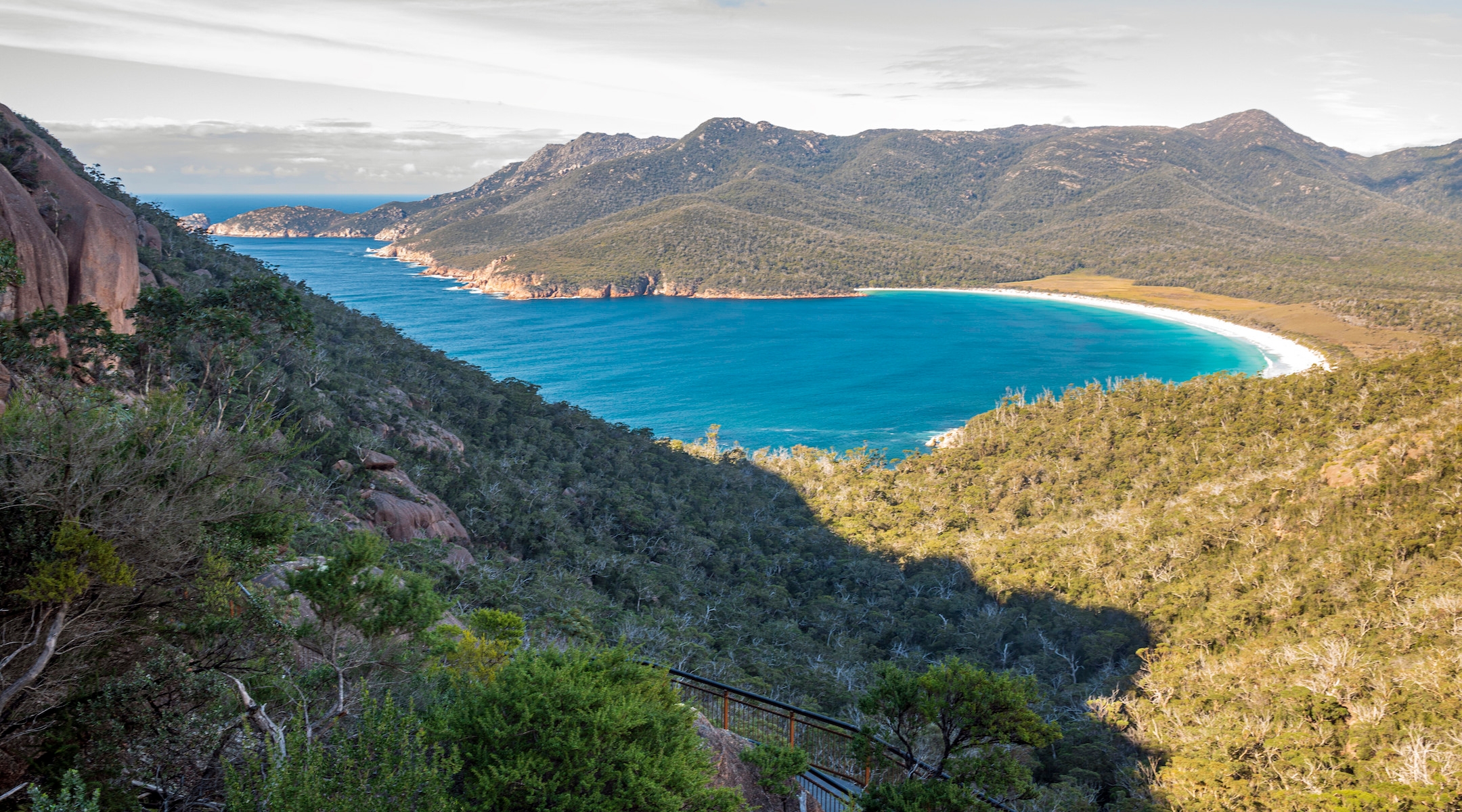
Wineglass Bay is one of Tasmania’s biggest tourist attractions. (Leisa Tyler/LightRocket via Getty Images)
Receiving a visit from a chief rabbi from any country in Launceston is a rare event. The last one took place 72 years ago, in 1951, when Rabbi Israel Brodie, Great Britain’s chief rabbi at the time, came to visit during his tour of Australia. Lau, a child survivor of the Holocaust and former chairman of the Yad Vashem Council, is an in-demand guest of honor at Jewish communities around the world. (His son David is now Israel’s chief Ashkenazi rabbi.)
Lau was a guest of Joseph Gutnick, a well-known Australian mining magnate originally from Melbourne. Worth close to half a billion dollars — and a power broker in the Chabad-Lubavitch Hasidic movement — Gutnick now lives in Tasmania. Gutnick is funding renovations of the synagogue with the approval of Australia’s National Trust, which administers the heritage-listed building.
“I thought it was appropriate to do something,” said Gutnick, who has a longstanding interest in Tasmania, which has included building the island’s only mikvah, or ritual bath, in Hobart more than 30 years ago. “I wanted to fix up the shul. Make it more usable. If we make it nice, more people will come.”
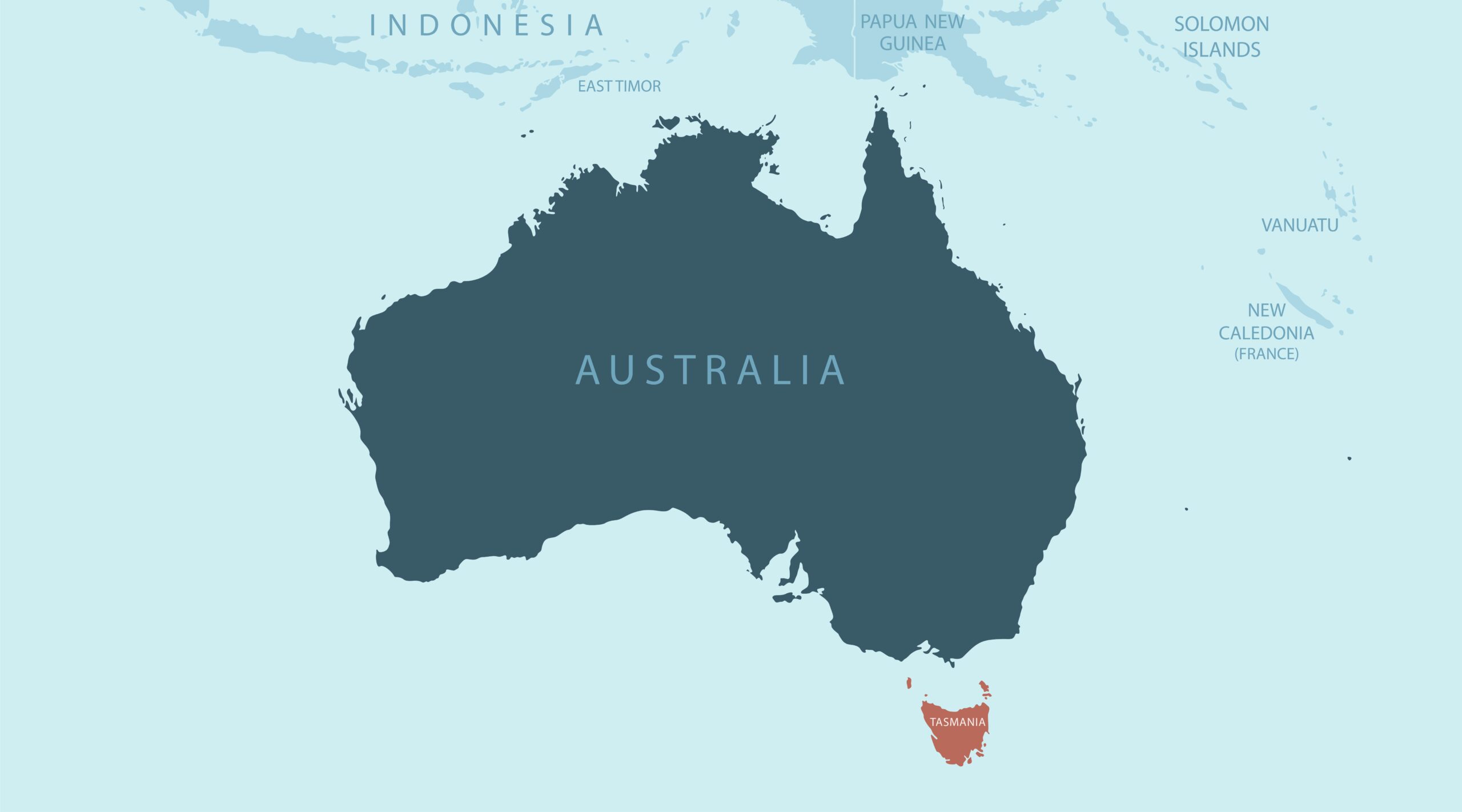
(Getty Images/Design by Grace Yagel)
Launceston’s Synagogue is built in the Egyptian Revival style, which incorporates motifs from ancient Egypt — an unusual look for a synagogue.
“It’s an interesting place at the edge of the world. It’s a very long way from everything but it’s still very much connected to world history,” Allen said. “This synagogue is a relic of a time when history wasn’t settled yet, but it’s still in use today, and that gives a tremendous sense of continuity and belonging.”
The history of Jews in Tasmania is long and checkered. In the 1940s, before the state of Israel was established, an explorer looking for a potential Jewish homeland scouted out the island’s coast but died on his mission. Over time, the number of Jewish people living in Tasmania has also ebbed and flowed; increases in immigration occurred during World War II, as European Jews fled Nazism, and in the 1980s, as a wave of Jews emigrated from South Africa.
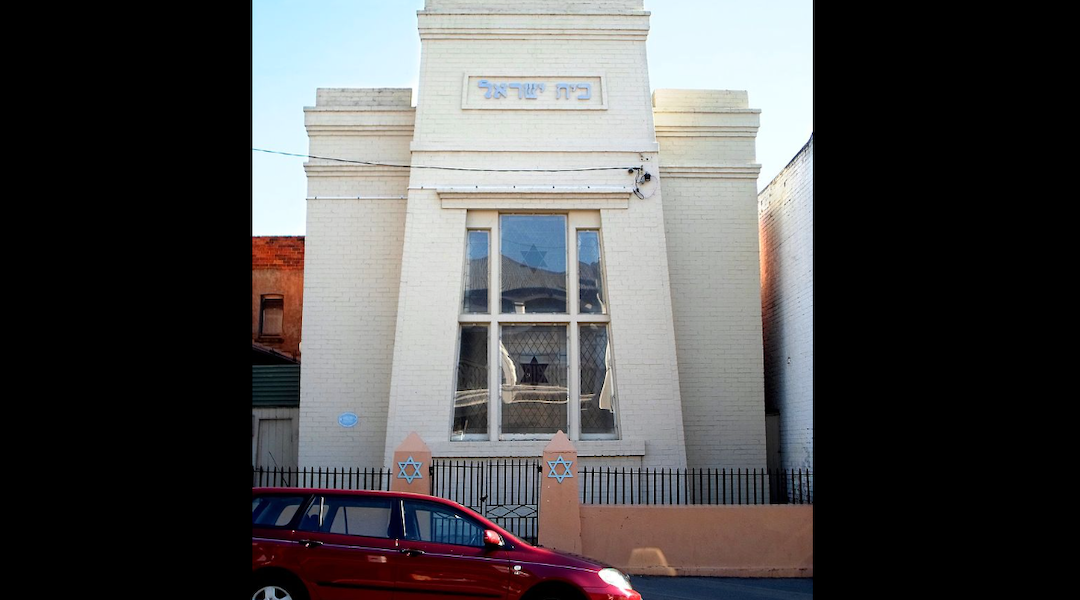
A view of the Launceston Synagogue. (Wriekhathaar/Wikimedia Commons)
Today, Tasmania’s Jewish community is once again growing. The 2021 Australian census showing a growth of almost 50% increase of Jews from 248 people in 2016 to 376 in 2021. No one has studied the reasons behind the increase, but housing in Tasmania is significantly cheaper than in other major cities, such as Melbourne and Sydney. Tasmania is also known across Australia as a retiree hotspot, especially for those fond of a quiet life and hiking.
Rabbi Yochanan Gordon and his wife Rebbetzin Rochel Gordon are Chabad emissaries on the island. He is confident that there are more Jews than officially recorded in the census, claiming to personally know more than the 376 recorded. He estimates that there are 250 Jews in Launceston and 1,200-1,300 throughout Tasmania.
His family has a long-term interest in Tasmania, as his father, Rabbi Yossi Gordon, a Melbourne-based rabbi, was sent by the Lubavitcher Rebbe, Menachem Mendel Schneerson, in the 1980s to conduct intermittent visits to the Jewish people of the island state.
For a tiny community like Tasmania, welcoming Lau and other dignitaries to Launceston Synagogue was an exciting event and a rare chance to fill the pews.
“We don’t usually get a minyan [prayer quorum of 10 men]. Every Sunday in the synagogue we also have a tefillin club with coffee, and a number of Jews come for tefillin club,” Yochanan Gordon said.
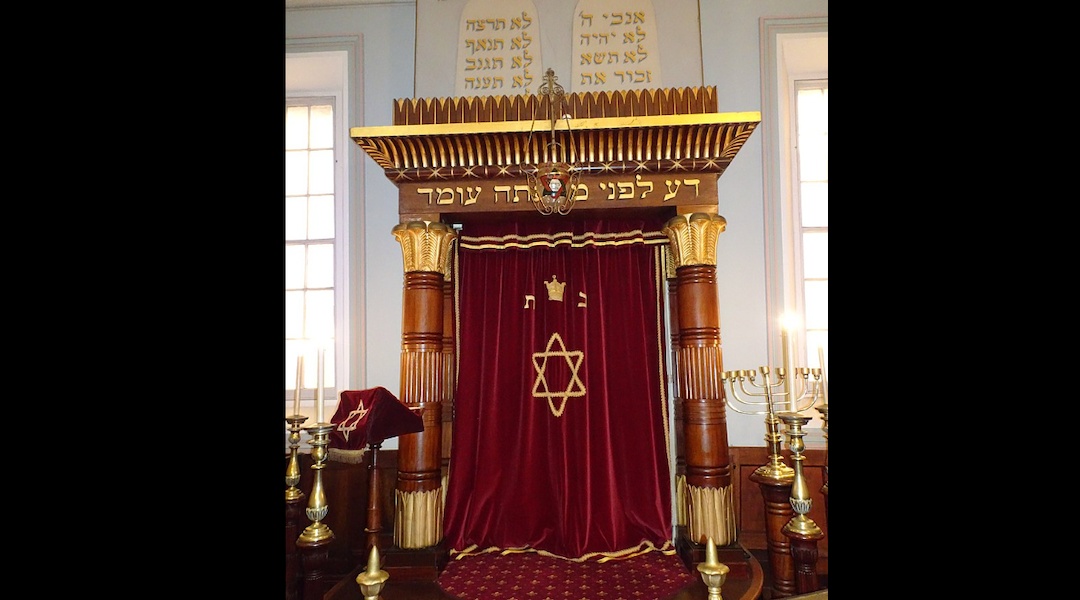
A view of the Torah ark at the Hobart Synagogue. (CutOffTies/Wikimedia Commons)
Despite living in Ulverstone, a mining town around a 90-minute drive from Launceston, Gutnick is invested in the success of the Launceston Synagogue. “I like supporting far flung places,” he said, referring to some of his work supporting Jewish life across the world, including in Antarctica.
And the importance of hosting an esteemed rabbi in one of the oldest synagogues in Australia is not lost on him.
“It’s such a historical place. The first convicts came and built the shul. People who were expelled and thrown out to one of the furthest places in the world, they built a shul. It’s quite a thrill,” he said.
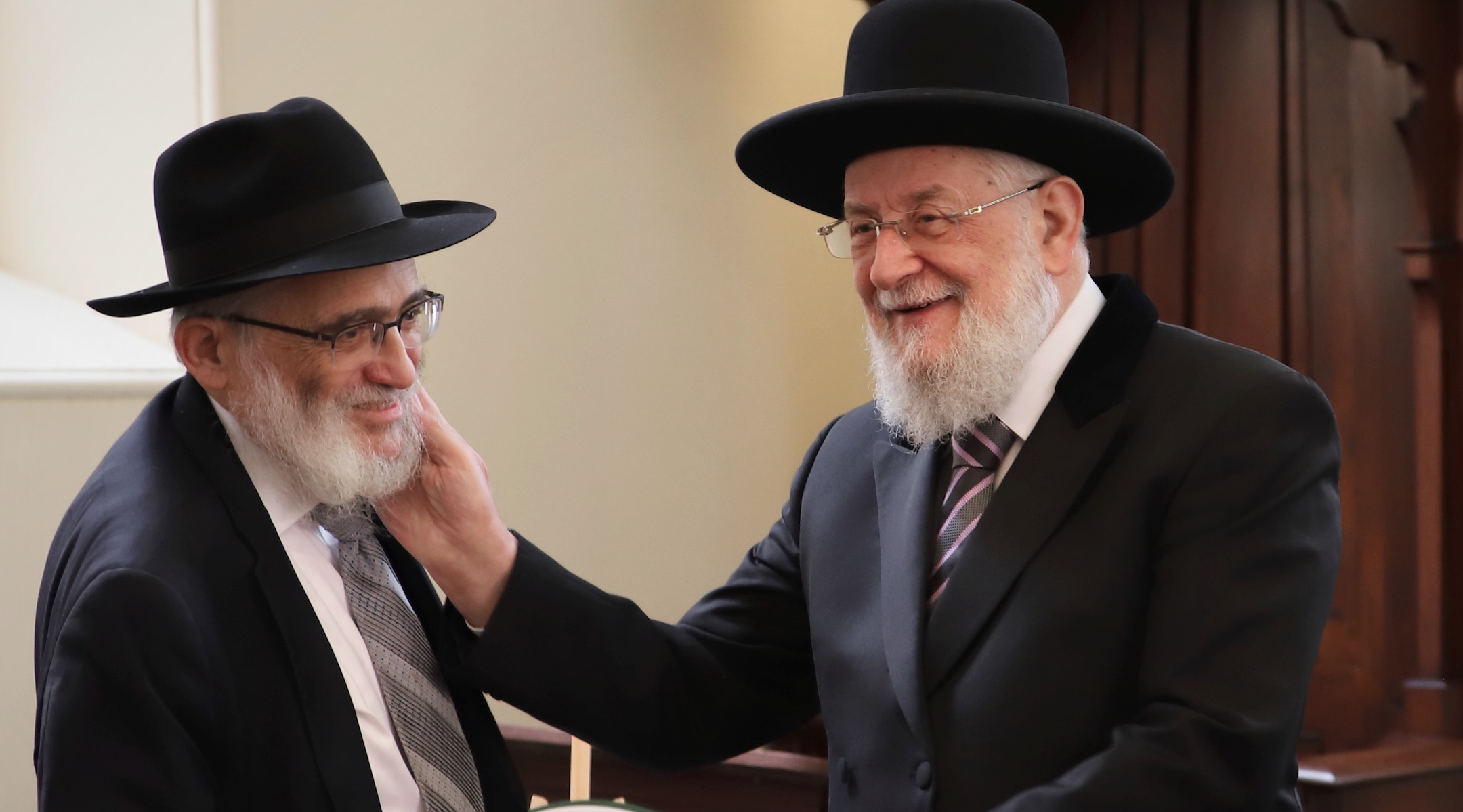
Lau shown with Joseph Gutnick, left, a mining magnate who is funding a renovation of the synagogue. (Mishka Gora)
In addition to paying for new carpets and a new bimah, or raised platform at the front of a synagogue, Gutnick hopes to pay for concrete patches to the Egyptian architecture on the front of the building, and a fresh paint job. Plans are also in the works to increase the scarce kosher options for people living in Tasmania, by creating a room at the back of the synagogue dedicated to preparing food.
Gutnick hopes the synagogue will eventually attract tourists, too.
Allan also felt that history was made this week with the rabbi’s visit.
“I think it’s amazing. This synagogue was built at a time when Judaism was nowhere near as well accepted by the general community. It was difficult for the community to get approval to build it. It’s a tiny postage stamp- size piece of land,” he said. “We are here, we have been here a long time, and we belong here.”
JTA has documented Jewish history in real-time for over a century. Keep our journalism strong by joining us in supporting independent, award-winning reporting.
